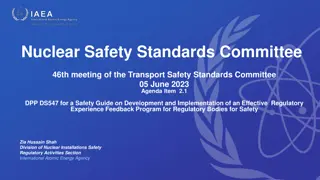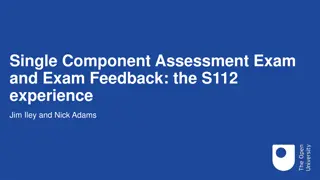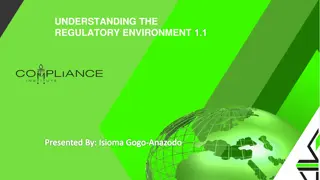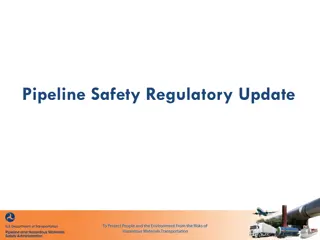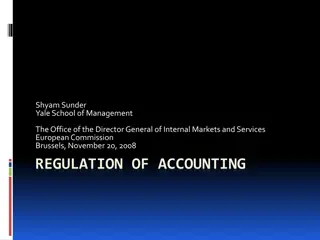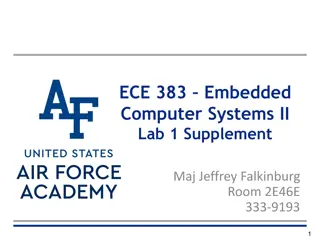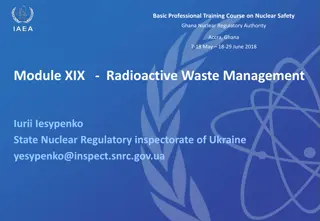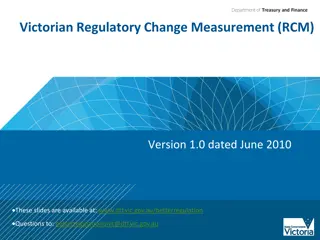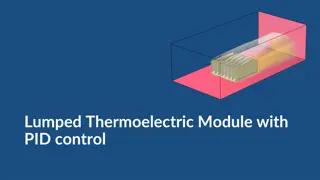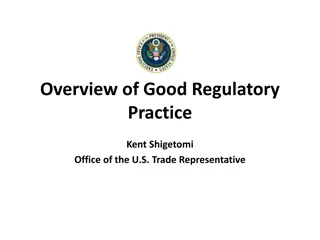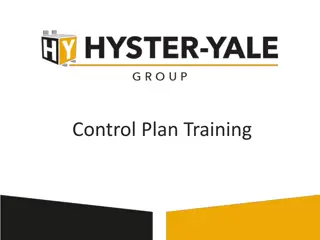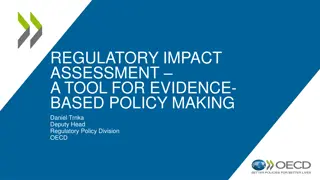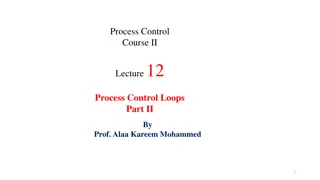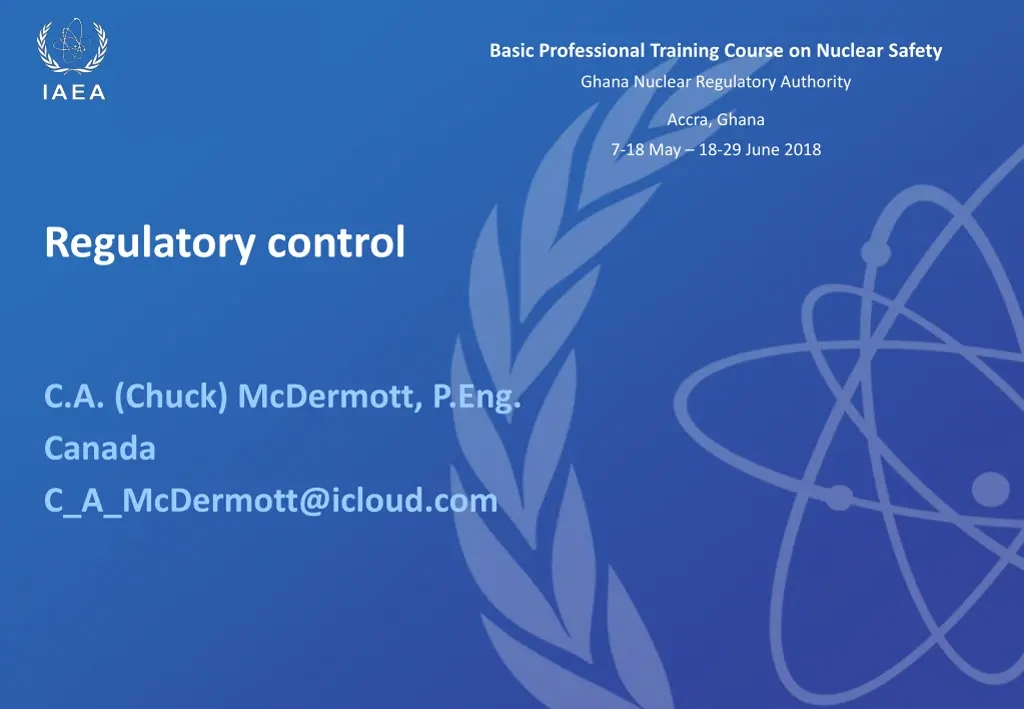
Nuclear Safety Training in Ghana: Regulatory Control Overview
Explore the comprehensive Basic Professional Training Course on Nuclear Safety by the Ghana Nuclear Regulatory Authority in Accra, covering regulatory control, legislative and regulatory frameworks, inspection, enforcement, and more. Gain insight into the global nuclear safety and security framework, national safety infrastructure elements, and the positioning of regulatory bodies within international, regional, and national networks. Learn about the Convention on Nuclear Safety and the importance of regulatory frameworks in ensuring nuclear safety.
Uploaded on | 0 Views
Download Presentation

Please find below an Image/Link to download the presentation.
The content on the website is provided AS IS for your information and personal use only. It may not be sold, licensed, or shared on other websites without obtaining consent from the author. If you encounter any issues during the download, it is possible that the publisher has removed the file from their server.
You are allowed to download the files provided on this website for personal or commercial use, subject to the condition that they are used lawfully. All files are the property of their respective owners.
The content on the website is provided AS IS for your information and personal use only. It may not be sold, licensed, or shared on other websites without obtaining consent from the author.
E N D
Presentation Transcript
Basic Professional Training Course on Nuclear Safety Ghana Nuclear Regulatory Authority Accra, Ghana 7-18 May 18-29 June 2018 Regulatory control C.A. (Chuck) McDermott, P.Eng. Canada C_A_McDermott@icloud.com
Contents Overview of regulatory control Legislative framework Regulatory framework Regulations and guides Authorization Review and assessment Inspection Enforcement Regulatory control 7-18 May 18-29 June 2018 2
Basic Professional Training Course on Nuclear Safety Ghana Nuclear Regulatory Authority Accra, Ghana 7-18 May 18-29 June 2018 Global nuclear safety and security framework
Regulatory control 7-18 May 18-29 June 2018 4
Convention on Nuclear Safety Entered into force on 24 October 1996 Currently has 84 Contracting Parties Ghana became contracting party in August 2011 Incentive convention (encourages Contracting Parties to comply, but no provisions for sanctions if a Contracting Party does not) First international legal instrument to explicitly consider nuclear safety Regulatory control 7-18 May 18-29 June 2018 5
Elements of the national safety infrastructure Legal framework Regulatory body Technical and industrial framework Scientific and economic framework Nuclear education and training Regulatory control 7-18 May 18-29 June 2018 6
Positioning the regulatory body International Framework Regional Networks National infrastructure Regulatory Body Regulatory control 7-18 May 18-29 June 2018 7
Basic Professional Training Course on Nuclear Safety Ghana Nuclear Regulatory Authority Accra, Ghana 7-18 May 18-29 June 2018 Overview of regulatory control
Overview Sound regulatory control is essential for ensuring that a nuclear power plant is safely: Sited; Designed; Constructed; Commissioned; Operated; and Decommissioned. Regulatory control 7-18 May 18-29 June 2018 9
Overview (Contd) Regulatory body acts independently of authorized party in national interest to ensure that level of safety is appropriate. However, this does not reduce the responsibility of authorized party to ensure that its activities are safe. Regulatory control 7-18 May 18-29 June 2018 10
Main functions of a regulatory body (RB) Establishing requirements; Issuing authorizations; Reviewing and assessing submissions from applicants and authorized parties; Inspecting facilities and activities; Enforcing compliance; and, Communicating with interested parties. Regulatory control 7-18 May 18-29 June 2018 11
Basic Professional Training Course on Nuclear Safety Ghana Nuclear Regulatory Authority Accra, Ghana 7-18 May 18-29 June 2018 Legislative framework
Learning objectives 1. Describe the legislative framework that is necessary for regulatory control to be effective. 2. Describe a possible legal structure of a comprehensive nuclear law. Regulatory control 7-18 May 18-29 June 2018 13
Legislative framework Achieving and maintaining a high level of safety in nuclear power plants (NPPs) depends on sound legislative framework Legislative framework describes how State will control the use of nuclear energy and provide necessary mechanisms and resources for this control IAEA Safety Standard GSR Part 1: Governmental, Legal and Regulatory Framework for Safety describes requirements for an adequate legislative framework This course focuses on NPPs, although most concepts are applicable to all nuclear facilities and activities Regulatory control 7-18 May 18-29 June 2018 14
Prime responsibility for safety First principle in IAEA Safety Fundamentals (SF-1) states: "The prime responsibility for safety must rest with the person or organization responsible for facilities and activities that give rise to radiation risks". The operating organization (authorized party) has essential and central role and, therefore, bears an important responsibility. Legislative framework must ensure that prime responsibility remains with authorized party. Regulatory control 7-18 May 18-29 June 2018 15
Legislative provisions Legislation is how a State establishes control over use of nuclear energy Legislation should: Set out objectives for protecting individuals, society and the environment; Articulate national policy and strategies for nuclear safety; Prohibit use of nuclear energy without authorization; Establish a RB with appropriate authority; Provide RB with adequate human and financial resources; and, Establish offences and corresponding penalties for contraventions. Regulatory control 7-18 May 18-29 June 2018 16
Legislative provisions (contd) Legislation should give RB authority to: Define and develop policies, safety principles/requirements and associated criteria; Establish regulations and issue guidance; Issue, amend, suspend or revoke authorizations; Inspect for compliance Enforce its regulations Communicate and liaise directly with public, other interested parties, other RBs and international organizations Regulatory control 7-18 May 18-29 June 2018 17
Comprehensive nuclear law One structure for a comprehensive nuclear law is illustrated below and on next four slides: Parts Article Contents PREAMBLE 1 Objectives OBJECTIVES 2 Definitions DEFINITIONS Scope of application 3 SCOPE Regulatory control 7-18 May 18-29 June 2018 18
Comprehensive nuclear law (contd) Parts Article Contents Establishment of the regulatory body. REGULATORY BODY 4 Functions and responsibilities. 5 Human and financial resources. 6 7 Advisory bodies. Regulatory control 7-18 May 18-29 June 2018 19
Comprehensive nuclear law (contd) Parts Article Contents AUTHORIZATION and NOTIFICATION 8 - 11 Authorizations OPERATOR S RESPONSIBILITIES Responsibilities of authorized parties 12 - 13 Inspection Enforcement INSPECTION and ENFORCEMENT 14 - 15 Regulatory control 7-18 May 18-29 June 2018 20
Comprehensive nuclear law (contd) Parts Article Various Contents For each subject area, for example: Radiological Protection Radioactive material and radiation sources Safety of nuclear installations; Emergency preparedness and response; Mining and milling; Transport Radioactive waste and spent fuel; SPECIFIC PROVISIONS Regulatory control 7-18 May 18-29 June 2018 21
Comprehensive nuclear law (contd) Parts Article Various Contents SPECIFIC PROVISIONS (Cont d) Nuclear liability and coverage; Safeguards; Export and import controls; and Physical protection OFFENCES and PENALTIES FINAL PROVISIONS Offences. Penalties. Various Final clauses, for example: Amendments; Repeals of earlier laws; Transitional period; etc. Regulatory control 7-18 May 18-29 June 2018 22
Basic Professional Training Course on Nuclear Safety Ghana Nuclear Regulatory Authority Accra, Ghana 7-18 May 18-29 June 2018 Regulatory framework
Learning objectives 1. Understand need for regulatory control 2. Describe role and organization of RB 3. Understand why independence is important for RB and how it can be achieved 4. Understand IAEA competency model for RBs 5. Identify core functions of RB Regulatory control 7-18 May 18-29 June 2018 24
Regulatory control Most States prohibit use of nuclear energy except in accordance with an authorization by the RB Authorizations are how State establishes and maintains regulatory control Any authorization needs to ensure that prime responsibility for safety remains with authorized party Regulatory control 7-18 May 18-29 June 2018 25
Regulatory control (contd) States use various terms for the concept of authorization, such as licence, permit or certificate. IAEA (and this presentation) uses the terms authorization and authorized party. Anauthorization is a formal permission issued to an authorized party, allowing the authorized party to site, construct, commission, operate or decommission a NPP. Most authorizations include conditions that authorized party must comply with. Regulatory control 7-18 May 18-29 June 2018 26
Overlapping jurisdictions In most States, RB is not the only authority that regulates some aspect of an NPP. Other authorities that may be involved include: Industrial health and safety authorities; Public health authorities; Environmental authorities; Building and electrical code authorities; Transport authorities (both for transport of dangerous good and for navigation purposes); Emergency preparedness and response authorities; Etc. Regulatory control 7-18 May 18-29 June 2018 27
Overlapping jurisdictions (contd) To avoid conflicts, RB should establish formal agreements with other authorities to clearly define how they will operate in a coordinated manner to limit regulatory gaps and overlaps. Even with formal agreements, good communication between various authorities is essential. Regulatory control 7-18 May 18-29 June 2018 28
The RB RB is how the State exercises control over the safety of NPPs. It includes: Sufficient competent technical staff Legal support Administrative support Many RBs make use of advisory bodies of outside independent experts, but they are normally separate from RB. Regulatory control 7-18 May 18-29 June 2018 29
Organization of the RB RB should be structured so it is capable of carrying out functions effectively, efficiently and independently Appropriate structure of RB depends on many factors, including: Nature of the national legal infrastructure State s cultural attitudes and traditions Existing governmental organization and procedures Technical, financial and human resources available in State Number and nature of regulated facilities and activities in State Regulatory control 7-18 May 18-29 June 2018 30
Organization of the RB (contd) In some States, there is more than one responsible authority. Typical situation is where one authority regulates radiation safety, while another regulates safety of facilities. In these cases, government must establish arrangements that ensure regulatory responsibilities and functions are clearly defined and coordinated. Regulatory control 7-18 May 18-29 June 2018 31
Organization of the RB (contd) If RB is not entirely self-sufficient in a technical or functional area, it should have the authority to seek advice or assistance from outside sources. When such external advice or assistance is provided, arrangements should be made to ensure that those providing it are effectively independent. Receiving external advice or assistance does not relieve RB of its responsibility for decision-making. Regulatory control 7-18 May 18-29 June 2018 32
Independence of the RB An important attribute of RB is its freedom from unwarranted interference in its regulatory functions. The Convention on Nuclear Safety states: Each contracting party shall take the appropriate steps to ensure an effective separation between the functions of the RB and those of any other body or organization concerned with the promotion or utilization of nuclear energy. Even so, an independent RB will not be entirely separate from other governmental bodies. Regulatory control 7-18 May 18-29 June 2018 33
Independence of the RB (contd) Measures that support effective independence include: Sufficient competent staff Sufficient financial resources Ability to make independent regulatory judgements and decisions Freedom from political and economic pressures Freedom from pressures from government departments, authorized parties, or other organizations Ability to give independent advice to government bodies on safety matters Access to the highest levels of government Ability to liaise with RBs of other States and with international organizations Regulatory control 7-18 May 18-29 June 2018 34
Management system of RB RB must establish an integrated management system that meets requirements of IAEA Safety Standard GSR Part 2. The module on Management Systems describes these requirements in detail and all are applicable to RB. Regulatory control 7-18 May 18-29 June 2018 35
Staffing and training for RB Ability of RB to fulfil its responsibilities depends largely on competence of its staff. IAEA Safety Standards and Safety Report No. 79 provide guidance on managing the competence of RBs. Report 79 also provides guidance on delivering training and other elements of competence development. IAEA TECDOC 1757: Methodology for the Systematic Assessment of Regulatory Competence Needs (SARCoN) for RBs of Nuclear Installations also provides useful information. Regulatory control 7-18 May 18-29 June 2018 36
IAEA competence model Competences comprise a combination of knowledge, skills and attitudes (KSAs). KSAs for each position in RB need to be established. IAEA competence model is based on a quadrant structure shown on next slide. Regulatory control 7-18 May 18-29 June 2018 37
IAEA competence model (contd) 1. Competences related to the legal, regulatory and organizational basis 2. Technical discipline competences 2.1. Basic science and technology 1.1. Legal basis 2.2. Applied science and technology 1.2. Regulatory policies and approaches 1.3 Regulations and regulatory guides 2.3. Specialized science and technology 1.4. Management system 4. Personal and behavioural competences 3. Competences related to the RB s practices 3.1. Review and assessment 4.1. Analytical thinking and problem solving 3.2. Authorization 4.2. Personal effectiveness and self- management 3.3. Inspection 4.3. Communication 3.4. Enforcement 4.4. Team work 3.5. Development of regulations and guides 4.5. Managerial and leadership competences 4.6. Safety culture Regulatory control 7-18 May 18-29 June 2018 38
Core functions of the RB The core functions of RB are: Establishing regulations and guidance; Issuing authorizations; Conducting reviews and assessments; Conducting inspections; and Taking enforcement actions. We will talk about each of these in turn later. Regulatory control 7-18 May 18-29 June 2018 39
Core functions of the RB (contd) Most RBs also consider provision of information as a core function. RB should provide information to: Public; Media; Legislature; and Other interested parties. There is a separate module on communication, so it will not be further discussed here. Regulatory control 7-18 May 18-29 June 2018 40
Additional duties of the RB Every RB will have some role in emergency preparedness and response, but precise activities vary greatly among States. RBs are responsible for ensuring that authorized parties have made adequate arrangements regarding emergency preparedness and response. Most RBs also have a responsibility for advising the government on nuclear safety matters during emergencies. Regulatory control 7-18 May 18-29 June 2018 41
Additional duties of the RB (contd) Specific to each State, but may include: Advising the government and other authorities on matters related to NPP safety; Confirming competence of personnel responsible for the safe operation of NPPs; Independent radiological monitoring in and around NPPs; Independent testing and quality control measurements; Initiating and coordinating safety-related research and development; Providing personnel monitoring services and conducting medical examinations; Monitoring of nuclear non-proliferation and implementing safeguards activities. Regulatory control 7-18 May 18-29 June 2018 42
Basic Professional Training Course on Nuclear Safety Ghana Nuclear Regulatory Authority Accra, Ghana 7-18 May 18-29 June 2018 Regulations and guidance
Learning objectives 1. Identify IAEA guidance on regulations and guides 2. Describe purpose of regulations and guides Regulatory control 7-18 May 18-29 June 2018 44
IAEA guidance on regulations and guides GSR Part 1 has three requirements on regulations and guides Requirement 32: The RB shall establish or adopt regulations and guides to specify the principles, requirements and associated criteria for safety upon which its regulatory judgements, decisions and actions are based. Requirement 33: Regulations and guides shall be reviewed and revised as necessary to keep them up to date, with due consideration of relevant international safety standards and technical standards and of relevant experience gained Regulatory control 7-18 May 18-29 June 2018 45
IAEA guidance on regulations and guides (cont d) Requirement 34: The RB shall notify interested parties and the public of the principles and associated criteria for safety established in its regulations and guides, and shall make its regulations and guides available. Regulatory control 7-18 May 18-29 June 2018 46
Regulations and guides Regulations and guides provide the basis for other RB core functions and therefore should be in place early in nuclear power programme. The IAEA Safety Requirements documents are written in a way that the RB can easily transform into regulations. Regulatory control 7-18 May 18-29 June 2018 47
Need for regulations and guidance Regulations are mandatory requirements that authorized parties must comply with. Guides provide advice on how applicants and authorized parties can meet the regulations. Guides are not usually mandatory. Applicants and authorized parties are usually free to propose alternative ways of satisfying the Regulations. States embarking on a nuclear power programme will already have some regulations and guides in place (radiation protection and possibly the authorization process). Regulatory control 7-18 May 18-29 June 2018 48
IAEA Standards for NPPs Following IAEA Safety Standards provide sound basis for set of NPP regulations: GSR Part 2: Leadership and Management for Safety GSR Part 4: Safety Assessment for Facilities and Activities GSR Part 7: Preparedness and Response for a Nuclear or Radiological Emergency SSR 2/1: Safety of Nuclear Power Plants: Design SSR 2/2: Safety of Nuclear Power Plants: Commissioning and Operation Regulatory control 7-18 May 18-29 June 2018 49
IAEA Standards for NPPs (contd) If a State does not already have regulations in place regarding radiation safety, GSR Part 3: Radiation Protection and Safety of Radiation Sources: International Basic Safety Standards provides a basis for those regulations Regulatory control 7-18 May 18-29 June 2018 50



